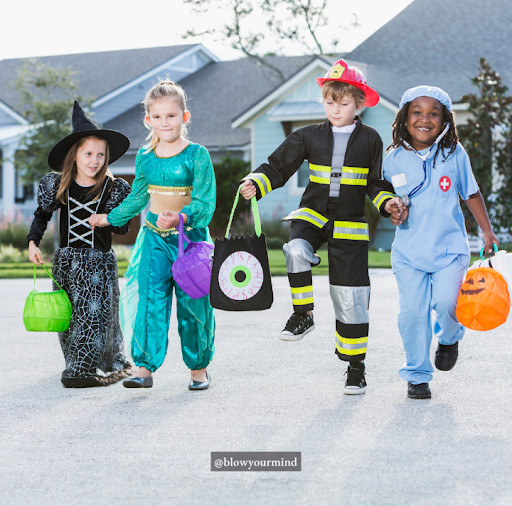Halloween, one of the world’s oldest holidays, is still celebrated today in a number of countries around the globe. But it is celebrated today by more people in more countries than ever before.
In Mexico and other Latin American countries, Día de los Muertos—the Day of the Dead—honors deceased loved ones and ancestors.
In countries such as Ireland, Canada and the United States, adults and children alike revel in the popular Halloween holiday, which derived from ancient festivals and religious rituals. Traditions include costume parties, trick-or-treating, pranks and games.
Other countries celebrate holidays similar to Halloween around the same time. In Mexico and other Latin American countries, for example, Día De Los Muertos is celebrated on November 1 and November 2. And in Italy, All Saints’ Day (November 1) is a public holiday (although American-style Halloween is growing in popularity).
Differences About Halloween Traditions In 23 countries Around The World.

Though Halloween is popular in countries like Russia and Sweden, it’s discouraged because of its Western-style roots and commercialism.
- United State –Halloween has been a popular holiday in the United States since the mid-19th century (when the costumes were much creepier than they are today). But it’s also been widely celebrated across the world for decades.
Furthermore, many countries celebrate Halloween with traditions like trick-or-treating, costumes, decorations, and jack-o-lanterns. In fact, the origins of Halloween can trace back to the British Isles where ancient Celts once practiced the pagan ritual Samhain to mark the shorter, darker days that followed the harvest.

- In New Zealand, as in neighbouring Australia, Halloween is not celebrated to the same extent as in North America, although in recent years the non-religious celebrations have been achieving some popularity especially among young children.
- Canada – In Canada, Halloween is celebrated quite a bit. It has been present since the 1960s – 1970s in Quebec.
Sweden – On All Hallow’s Eve, a Requiem Mass is widely attended every year at Uppsala Cathedral, part of the Lutheran Church of Sweden. - Bosnia and Herzegovina – Halloween is a work day in Bosnia and Herzegovina, and not celebrated until recently. For the past few years, it has been popular among younger generations.
- Germany – Halloween was not generally observed in Germany prior to the 1990s, but has been increasing in popularity. It has been associated with the influence of United States culture, and “Trick or Treating” (in German, “Süßes sonst gibt’s Saures”) has been occurring in various German cities, especially in areas such as the Dahlem neighborhood in Berlin.
Check out our community to learn more as: https://bitly.com.vn/lo93us
- Greece – Halloween has been increasing in popularity in Greece during the 2010s, as a commercial and secular celebration.
- Ireland – A traditional Irish turnip (rutabaga) jack-o’-lantern, c. early 20th century, on display in the Museum of Country Life, Ireland. It is the night that the dead are freed from their graves. So the living build huge bonfires to protect themselves.
- Italy – In Italy All Saints’ Day is a public holiday. On 1 November, Tutti i Morti or All Souls’ Day, families remember loved ones who have died.
- Romania – Romanians observe the Feast of St. Andrew, patron saint of Romania, on 30 November. On St. Andrew’s Eve ghosts are said to be about.

When the Romans conquered the Celts in the 1st century CE, they added their own festivals of Feralia, commemorating the passing of the dead, and of Pomona, the goddess of the harvest. - Russia – In Russia most Christians are Orthodox, and in the Orthodox Church Halloween is on the Saturday after Pentecost and therefore 4-5 months before western Halloween.
- Poland & Czech Republic – Since the fall of Communism in 1989, Halloween has become increasingly popular in Poland and the Czech Republic. Particularly, it is celebrated among younger people.
In Poland some people celebrate Halloween but it is not on a massive scale yet. They have their own traditions there but some people don’t stick with them. However, people here are more about All Saint’s Day instead of Halloween. - Switzerland – In Switzerland, Halloween, after first becoming popular in 1999 is on the wane, and is most popular with young adults who attend parties.
How’s about Halloween in old countries as UK or Scotland?
- United Kingdom – In the past, on All Souls’ Eve families would stay up late, and little “soul cakes” were eaten. These days the U.K. does. In the past 10 years or so Halloween as a holiday for children particularly has really taken off. Years ago it was quite unusual to celebrate, even though there were some old traditions associated with it. Guy Fawkes Night on the 5th November was much more prevalent.
- Scotland – the name Halloween is first attested in the 16th century as a Scottish shortening of the fuller All-Hallows-Even, that is, the night before All Hallows Day.

How about the celebrations among Asia countries? Is there any difference?
- China – the Chinese celebrate the “Hungry Ghost Festival” in mid-July, when it is customary to float river lanterns to remember those who have died.
- Hong Kong – traditional in many buildings catering to expatriates, Halloween parties and limited trick or treating is arranged by the management. Instances of street-level trick or treating in Hong Kong occur in ultra-exclusive gated housing communities such as The Beverly Hills populated by Hong Kong’s super-rich and in expatriate areas like Discovery Bay and the Red Hill Peninsula.
- Japan – Halloween arrived in Japan mainly as a result of American pop culture. As recently as 2009, it was not appreciated and only celebrated by expats.
- Philippines – the period from 31 October through 2 November is a time for remembering dead family members and friends.
- Singapore – around mid-July Singapore Chinese celebrate “Zhong Yuan Jie / Yu Lan Jie” (Hungry Ghosts Festival), a time when it is believed that the spirits of the dead come back to visit their families.
- Australia – while not traditionally a part of Australian culture, increasingly it’s being celebrated in Australia where it started as mainly a holiday pushed by the commercial makers of candy and retailers, it’s gained ground in recent years and is now being pushed as a tradition.
Let’s check our other articles at: https://souljourneyy.com/

